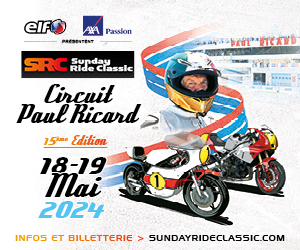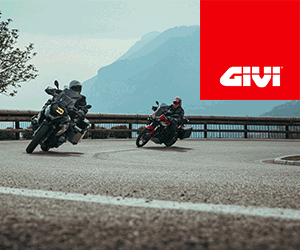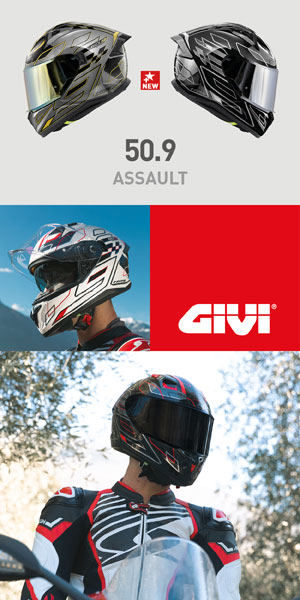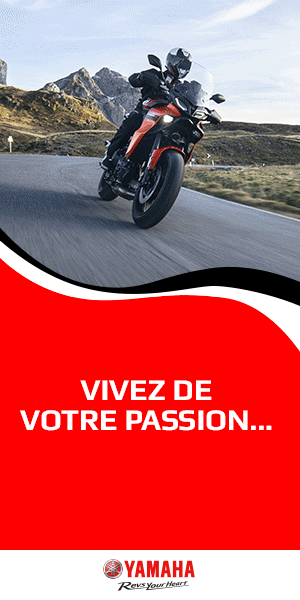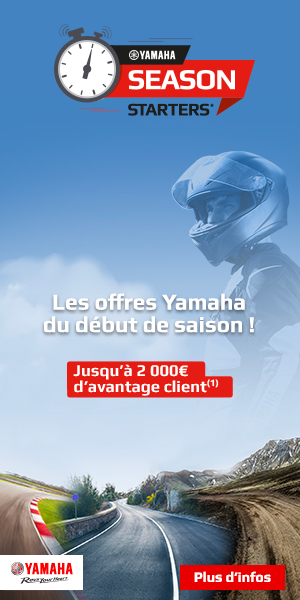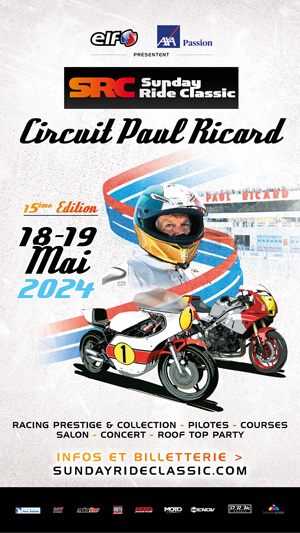 Valentino Rossi, Marc Marquez and Jorge Lorenzo are names that make all French racing motorcycle racing enthusiasts dream. France is also rather well represented in this area, with Loris Baz and Mike di Meglio in MotoGP, Johann Zarco and Louis Rossi in Moto2, Fabio Quartararo, Alexis Masbou and Jules Danilo in Moto3.
Valentino Rossi, Marc Marquez and Jorge Lorenzo are names that make all French racing motorcycle racing enthusiasts dream. France is also rather well represented in this area, with Loris Baz and Mike di Meglio in MotoGP, Johann Zarco and Louis Rossi in Moto2, Fabio Quartararo, Alexis Masbou and Jules Danilo in Moto3.
But these drivers only represent a part of French speed, even if they are its elite, the top of the pyramid, the culmination of years of sacrifices and efforts, both physical and mental as well as financial. This is why, on the occasion of the three days of detection organized by the French Motorcycling Federation on the Carole circuit from August 5 to 7, 2015, we went there to understand how the other side of the pyramid was managed. , its basis.
Jacques Bolle, President of the French Motorcycling Federation, was present with the Federation's speed officials. At the end of the day, we took the opportunity to meet him and ask him a few questions, about these three days, but also about the French Championship and the Grands Prix.
Mr President, if we have understood correctly, these days are aimed at a public divided into three categories; neophytes who are introduced to motorcycling on the circuit, pilots who already ride motorbikes competitively but not on the circuit, generally off-road, to whom we introduce them to speed, and finally pilots of various speed championships who are allowed to train for free.
Jacques Bolle: “To train, but also to test them and see what their level is by putting them on a Moto3. The goal is, on a very large panel, to learn lessons and possibly detect people. There is indeed both a discovery side of motorcycling, of motorcycling sport, this was in particular the aim of the operations that we carried out in Les Ecuyers, in Roanne or in Mérignac with the traveling school.
Here, at Carole, the spectrum is much broader; there is this initiation, but there is also clearly this detection phase, as you can see today where she is working in full force. »
With this in mind, which is undoubtedly to revitalize French speed….
Jacques Bolle: “Revitalize doesn’t seem like the right term to me because it might give the impression that it’s dying. French motorcycle sport, contrary to what people say in the paddocks, is doing very well. »
 So let’s say speed sport…
So let’s say speed sport…
Jacques Bolle: “We’re just going to probably be world champions this year. We can always do better, it's true (laughs). We already were last year, with Sylvain Guintoli, and we will probably be again this year with Johan Zarco, and perhaps Jules Cluzel. Not to mention the endurance where we are regularly. So French speed is going well. So now, and I have already said it, if the only reference for comparison is Spain or Italy, yes, it's true, we will hardly be able to play in the same league, at least in the current state of affairs. We experienced a reverse era, moreover, where you had to be French to be on the podiums in Grand Prix and I knew it well. Today, you have to be Spanish or Italian. If tomorrow Dorna is bought by Claude Michy, we'll see, maybe we'll have to be French! There have always been cycles, the Finnish cycle, the American cycle, etc.
Of course we can always do better, of course we are not at the level of the Spaniards but we will still probably be world champion in Moto 2 this year, we were last year in SBK, we won a big prices in Moto3 at the start of the season, you could still find worse! »

So precisely, with this very particular perspective of accessing the Grands Prix, I was referring to this moto3 category which is now absent in France and which constitutes a small break, both material and psychological, because it directs young riders towards the 600cc, which will probably never take them to grand prix but rather to Superbike or Endurance. Today, is the interest of the Federation to rebuild this sector, and it is in relation to this that we used the word "revitalize", or is it rather to develop towards the leisure side to reach a larger number?
Jacques Bolle: « It is clear that there is a break today at the level of Moto3. Note also that this break is not French but European since even the Spanish are having a lot of difficulty with their national Moto3 championship. I think there were 12 or 13 registered for the last race, including 6 or 7 Spaniards and 2 or 3 French. I am talking about the Spanish championship, organized by the Spanish Federation, and not the European championship organized by the FIM and Dorna. Once again, let's compare what is comparable, otherwise, we are not playing on equal terms. If TF1 organized a championship, things would undoubtedly be different…
In the meantime, the German Moto3 championship had also disappeared. They are trying to recreate it today by subsidizing it with a budget of almost 200 euros! The environment is therefore very difficult for the Moto 000.
That said, it is not because others have the same difficulties as us that we must be satisfied with them and the goal is indeed to recreate something which takes the intermediate step that you mentioned in a preliminary manner.
Thierry Capela was present today because he has a project in this area. This interests us and we will therefore work to try to develop a category which will not be with Moto3, because its main fault is being too expensive, but a pre-moto3 category at competitive prices and generally similar to this what the 125 2-stroke cost previously.
These motorcycles will undoubtedly be a little more fun and a little more fashionable, because the fashion effect is absolutely enormous. Let's not forget that at the end of the French Moto3 championship, the 125 2-strokes could still be used at a lower cost. Certainly, it was more difficult to win, but since only 3 or 4 pilots were really able to compete for victory, the others could use these 125 to train, train, progress, or even get noticed, and all this for a reasonable cost. However, they were extremely rare because these motorcycles were no longer fashionable, 4-strokes were needed.
 Let's take another example. When Eric de Seynes, the boss of Yamaha, came to see me to tell me that he would like to set up the 125 YZR cup in the federal series, so that it would grow a little more, I told him that I agreed but was very doubtful. I didn't really believe it, based on the experience of the Junior Cup. I considered that the potential for a formula intended for young people around 12 years old no longer existed, including for an inexpensive formula. After Florian Marino, the Junior Cup collapsed in 2 or 3 years and the only reason we found to explain this disaffection was that it was no longer fashionable. In fact, the two formulas were completely comparable, but Yamaha arrived with a much more "fashionable" product; the bikes were more recent, the presence of Johann Zarco made the formula attractive, Yamaha's support gave it credibility, etc. .
Let's take another example. When Eric de Seynes, the boss of Yamaha, came to see me to tell me that he would like to set up the 125 YZR cup in the federal series, so that it would grow a little more, I told him that I agreed but was very doubtful. I didn't really believe it, based on the experience of the Junior Cup. I considered that the potential for a formula intended for young people around 12 years old no longer existed, including for an inexpensive formula. After Florian Marino, the Junior Cup collapsed in 2 or 3 years and the only reason we found to explain this disaffection was that it was no longer fashionable. In fact, the two formulas were completely comparable, but Yamaha arrived with a much more "fashionable" product; the bikes were more recent, the presence of Johann Zarco made the formula attractive, Yamaha's support gave it credibility, etc. .
In reality, the same product, with a lick of paint, worked again.
We have learned this lesson and, today, we must recreate a category that is sufficiently established, with fashionable motorcycles and a renowned sponsor, to be attractive. This is what Thierry Capela is offering us to do, with a pre-moto3 category at attractive prices, far from those of Moto3, and a sufficiently large field to introduce it within the framework of the French championship. »

What will be the characteristics of these motorcycles?
Jacques Bolle: « The principle is a motocross or enduro engine, whatever the brand, 250cc 4-stroke, which develops around 36 horsepower, or generally the same power as the 125 2-stroke, with an original chassis. This will not be a single-brand formula and we hope that several brands will wish to invest in this project. It is difficult to find brands that agree to sell motors alone but we remain optimistic on this point. »
Will we be able to build our own motorcycle in our corner?
Jacques Bolle: « A priori, yes, but it will be very seriously supervised. The goal is to absolutely avoid an arms race. It's quite easy for the mechanical part, with referenced parts, like in Promosport, but it's more difficult when it comes to the electronics. However, we will monitor this strictly. »
 You therefore reconstruct the missing step of the pyramid. Would you also like to broaden the base of the latter by promoting leisure and motorcycle schools?
You therefore reconstruct the missing step of the pyramid. Would you also like to broaden the base of the latter by promoting leisure and motorcycle schools?
Jacques Bolle: « Yes. We are working on this avenue and we will summarize it. I cannot forget the Alexis Masbou case. You should know that if there had not been a school on the Albi circuit, he would probably never have been a motorcycle pilot. His mother did not particularly have great means and was totally foreign to motor sports, but Alexis one day had the opportunity to ride on the small indoor track of the circuit and fell in love with motorcycling. The low cost allowed his mother to enroll him in school, then he got noticed and helped by various people. He then climbed the ranks that we know, but if it hadn't been for this school, he would probably never have ridden a motorcycle. This is also why we do this type of operation, like in Mérignac, Les Ecuyers or here, because we can think that among the people who discover motorcycles, without necessarily being enthusiasts initially, some will then be able to continue towards the competition. »
 These operations apparently constitute a success...
These operations apparently constitute a success...
Jacques Bolle: « Indeed, we could see that the demand was strong. We have around 120 requests each time and we can only offer 100 places. We will therefore try to perpetuate and expand these operations, knowing all the same that this comes at a cost, since the participants only pay between 30 and 50 euros, while we provide the infrastructure, the personnel, the insurance and all the equipment, leather helmets and motorcycles included, without any return on investment in the short term. »
According to what we have observed, the current strategy of the FFM is therefore as follows:
– Promote the discovery of motorcycle riding,
– Make it more accessible by setting up inexpensive formulas (such as the French 25 Power Championship),
– Detect certain drivers to then integrate them into the Elite Group,
– Create a new low-cost category to replace the ex-Moto3 in France,
– Maintain financial assistance for all Grand Prix drivers thanks also to a pooling of resources with the organizer of the French Grand Prix (editor’s note: we are only talking here about speed Grand Prix but the FFM also helps drivers in Supersport, Motocross, Enduro or other disciplines).
For information, for interested parents, here are the dates scheduled for this end of year with the FFM Traveling Motorcycle School:
– Muret (31): September 19 (with Mike Di Meglio)
– Le Creusot (71): October 10-11
– Alès (30): October 17-18
To be continued…













